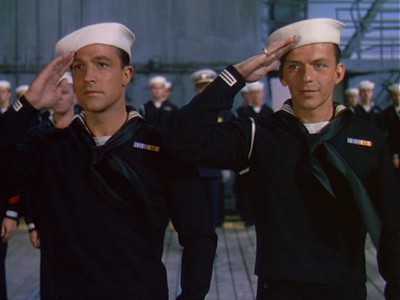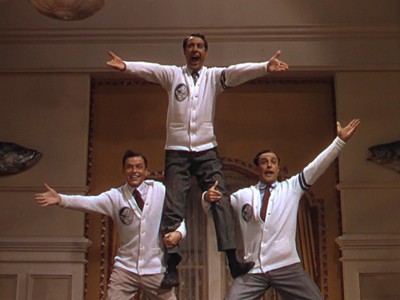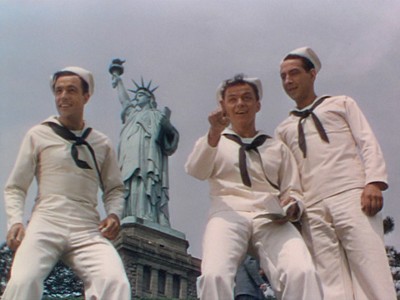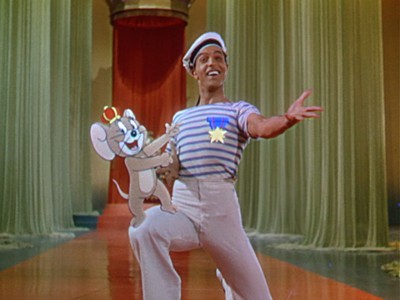| Reviews & Columns |
|
Reviews DVD TV on DVD Blu-ray 4K UHD International DVDs In Theaters Reviews by Studio Video Games Features Collector Series DVDs Easter Egg Database Interviews DVD Talk Radio Feature Articles Columns Anime Talk DVD Savant Horror DVDs The M.O.D. Squad Art House HD Talk Silent DVD
|
DVD Talk Forum |
|
|
| Resources |
|
DVD Price Search Customer Service #'s RCE Info Links |
|
Columns
|
|
|
Frank Sinatra and Gene Kelly Collection, The
Warner Bros. // Unrated // May 13, 2008
List Price: $24.98 [Buy now and save at Amazon]
 They were an unlikely screen team, both a study in contrasts: the scrawny kid with the deep, deep voice and the athlete with a love for ballet. Together, Frank Sinatra and Gene Kelly would make three films at Metro-Goldwyn-Mayer, musicals that have endured for over sixty years.
They were an unlikely screen team, both a study in contrasts: the scrawny kid with the deep, deep voice and the athlete with a love for ballet. Together, Frank Sinatra and Gene Kelly would make three films at Metro-Goldwyn-Mayer, musicals that have endured for over sixty years.Their first union came in 1945, with "Anchors Aweigh." This would be Kelly's eight film since his screen debut only four years earlier, and by now he had such superstar clout that MGM was willing to try to strike a bargain with Walt Disney in an effort to borrow Mickey Mouse for an on-screen duet with their leading man. Disney balked at the deal, leaving Metro to make a quick substitution: Jerry Mouse. The two would unite for a dance sequence set to "The King Who Couldn't Dance" - a live action/animation combo that's become one of the most beloved moments in movie history.
It's a marvel of filmmaking; the precision of all elements remains astounding, but more importantly, the scene is just plain fun. It's one of two fantasy scenes contained within the story, flights of cinematic fancy that would soon become a Kelly trademark. Here, these musical asides reveal a film eager to be anything and everything in an effort to provide big-scale entertainment: romance, comedy, and music, music, music.
Sinatra, meanwhile, saw "Anchors" as his first major starring role. The crooner had a couple uncredited appearances in previous musicals as part of the Tommy Dorsey Orchestra, then found some leading roles in smaller pictures over at RKO. In 1944, Louis B. Mayer bought out Sinatra's RKO contract and set him up at MGM, where he was immediately paired with Kelly.
Here, the filmmakers take a winking stab at Sinatra's standing with his swooning bobbysoxer fans: they take Ol' Blue Eyes and make him a sap who can't find any luck with the ladies. Sure, he'd find true love before too long, but only thanks to help from his pal Gene Kelly - not to mention the pushiness of the fairer sex, sassy gals who would overpower the skinny guy. (The formula of ladies' man Kelly and unlucky-in-love Sinatra worked so well that all three of their films would be based on some variation of it.)
Joe (Kelly) and Brooklyn (Sinatra) are a couple of sailors enjoying some well-earned shore leave in Hollywood. Both are eager for love, but their plans are sidetracked when they stumble upon Donald (a very young Dean Stockwell, his second movie role), a stubborn little boy who's running away to join the Navy. The sailors are talked into seeing the boy home, where they meet his aunt, aspiring singer Susan (Kathryn Grayson). Brooklyn falls madly in love right away, and Joe, eager to help his pal, fast-talks his way into a heck of a whopper: they'll arrange a meeting for her with pianist/conductor José Iturbi (appearing as himself), whom Joe claims is an old friend.
The fellas must then figure out how to sneak onto the MGM lot and make this fictional meeting come true. Along the way, Joe winds up falling for Susan as well, while Brooklyn gets a change of heart when he meets a lovely waitress (Pamela Britton) from his hometown. Joe's afraid to admit his feelings to Brooklyn (can't steal a pal's girl, can he?), and Brooklyn's afraid to do the same to Joe (can't make Joe feel like all that hard work's gone to waste, can he?).
MGM vet George Sidney directs the whole thing with flair, letting the charms of its stars and the whimsy of the screenplay (by Isobel Lennart) wash over the audience. This is a story bursting with light joy. Just watch as Sinatra realizes he's fallen in love with the right dame - he gives a little kick in the air that effortlessly captures the wondrous elation of romance. Sinatra and Kelly prove themselves to be an invaluable duo, each playing off the other with such breezy attitude that we're convinced from the first frames that these are old pals.
Of course, the real centerpiece of "Anchors" is the music. The film makes the most of both stars' diverse styles. Sinatra gets to croon his heart out on such ballads as "I Fall in Love Too Easily" and "The Charm of You" (not to mention a fabulous take on "Brahms' Lullaby"). Kelly, meanwhile, tackles lighter fare, going solo on "The King Who Couldn't Dance." When the two sing together, it's on fast-paced dance numbers ("We Hate to Leave," "If You Knew Susie") built around Kelly's excellent choreography. (Who knew the skinny crooner could keep up with Kelly's hoofing?)
"Anchors" would go on to land five Oscar nominations, including Best Actor for Kelly (regrettably, it would be the only such nomination throughout his entire career) and Best Picture; it would win for Best Scoring of a Musical.
 Kelly and Sinatra wouldn't reunite until 1949, but what a year for them. "Take Me Out to the Ball Game" would premiere in April; "On the Town" in December. Both were sizable hits for the duo (especially for Sinatra, who felt his career had stumbled in the years prior), prime examples of the MGM formula at work.
Kelly and Sinatra wouldn't reunite until 1949, but what a year for them. "Take Me Out to the Ball Game" would premiere in April; "On the Town" in December. Both were sizable hits for the duo (especially for Sinatra, who felt his career had stumbled in the years prior), prime examples of the MGM formula at work."Ball Game" would serve as Busby Berkeley's final complete project as a director, and his famous visual flair is mostly absent here. Gone is the kaleidoscopic imagery of earlier efforts, replaced by the more straightforward style preferred by Kelly and Stanley Donen, the choreographers for the film. (Berkley had lobbied for an underwater musical sequence featuring the film's costar, Esther Williams, but Kelly refused.)
No matter. The dance routines on display are as vibrant as ever, with Kelly wowing audiences with such numbers as "The Hat My Dear Old Father Wore Upon St. Patrick's Day" and, with Sinatra and vaudevillian Jules Munshin, "O'Brien to Ryan to Goldberg." These bold sequences help carry the movie through its saggier moments.
Kelly, Sinatra, and Munshin play (respectively) Eddie, Dennis, and Nat, a trio of baseball superstars at the turn of the century. They're dismayed to learn that their team has just been inherited by K.C. Higgins, who turns out to be - gasp! - a woman (Williams). But what a woman! K.C. is as beautiful as she is crazy about baseball. Once again, Kelly and Sinatra find themselves initially wooing the same gal, although Dennis quickly steps aside, finding himself the object of desire for devoted fan Shirley (Betty Garrett). (The scene where Shirley strongarms Dennis into romance, set to "It's Fate, Baby, It's Fate," is one of the movie's highlights.)
The story (screenplay by Harry Tugend and George Wells, from a treatment by Kelly and Donen) is rather lightweight, mainly a series of fluffy episodes built around key musical numbers. Eddie and Dennis are shown to have a vaudeville act in the off season, and late in the film, Eddie is talked into starring in his own musical showcase. It's pretty uncomplicated stuff, with emphasis on music and comedy, not character or emotion.
But it's brilliant music (just try getting Kelly's Irish jig out of your head - it can't be done), and the comedy is a snap, with K.C.'s presence supplying plenty of "there's no crying in baseball!" style punchlines that still hold up despite the obvious gender clichés. The mix of romance, baseball, and turn-of-the-century nostalgia makes it a swell piece of colorful Americana.
Kelly and Donen would graduate to the director's chair(s) for their next project, "On the Town." Adapted from the stage play by Adolph Green and Betty Comden (who, being studio vets, would write the screenplay themselves), "On the Town" was something of an East Coast update of "Anchors Aweigh." This time, we get a trio of sailors - Gabey (Kelly), Chip (Sinatra), and Ozzie (Jules Munshin, one of several "Ball Game" elements returning here) - enjoying 24 hours leave in the Big Apple. The shorter time span gives the film a hectic, City-That-Never-Sleeps pace that makes the romance less believable yet more energetic; there's an urgency to this movie, from the very first scene, when a mad rush of sailors interrupt a dock worker's quiet morning.
 The story is fueled by the fellas' discovery of "Miss Turnstiles," a subway poster gal (Vera-Ellen) that becomes the object of Gabey's one-day obsession. The sailors agree to help Gabey scour the city looking for her. Along the way, Chip catches the eye of female cabbie Brunhilde (Garrett, in a more fleshed-out version of her pushy "Ball Game" role), and Ozzie meets Claire (Ann Miller), a scientist turned on by the Navy man's brutish ways.
The story is fueled by the fellas' discovery of "Miss Turnstiles," a subway poster gal (Vera-Ellen) that becomes the object of Gabey's one-day obsession. The sailors agree to help Gabey scour the city looking for her. Along the way, Chip catches the eye of female cabbie Brunhilde (Garrett, in a more fleshed-out version of her pushy "Ball Game" role), and Ozzie meets Claire (Ann Miller), a scientist turned on by the Navy man's brutish ways.Will they find Miss Turnstiles? And if they do, will she agree to a night on the town? Of course they do, and of course she does, although it's more complicated than that, especially once Brunhilde's man-hungry sad sack roommate Lucy (a scene-stealing Alice Pearce) enters the picture.
With Donen and Kelly at the musical helm, it's no surprise that the song-and-dance numbers are top notch. Boosting the production value is MGM's decision to allow for location shooting - making this the first movie musical to shoot on the streets of New York. Such sights add an extra visual oomph to the proceedings, with the city portrayed in a near-mythological light. The film's opening number, "New York, New York," is a manic, glorious tour of the metropolis, with all the city's key landmarks presented as must-see gems.
Kelly also manages to sneak in one of his patented mid-movie ballet fantasies, the sort of Technicolor marvel that push the limits of what a movie musical could be, later making "An American in Paris" and "Singin' in the Rain" classics of the genre. Here, Gabey envisions of the day's events as a three-act ballet set to the music of Leonard Bernstein. Musically, it's a winner, although it's ultimately not as polished as his later works, mainly because the technical aspects of the sequence require stand-ins for all of the movie's stars (except for Kelly and Vera-Ellen), which ultimately makes the scene feel more like a cinematic gimmick than a natural extension of the movie.
The script also gets a bit too out of hand in the third act, which wraps up with a car chase through Brooklyn and a trip to Coney Island. Chalk this up to thin plotting that once again puts music over character; while "Anchors Aweigh," with its excellent handling of the storyline, feels too short at two full hours, "On the Town" feels a hair too long at 98 minutes.
Ah, but those are ultimately minor grumbles over what's rightly become a well-loved classic. "On the Town" would go on to win the Oscar for Best Scoring of a Musical, and more importantly, it would become one of the most fondly remembered films for both of its stars. Sinatra and Kelly never made another movie together, but their three collaborations stand as wonderful examples of enchanting light entertainment from the golden age of Hollywood musicals.
The DVD
Warner Bros. has collected all three films into "The Frank Sinatra and Gene Kelly Collection," a box set being released as part of the studio's recent rush of Sinatra films being released on DVD. All three films have been available on disc for years now, and these are the same discs that appear in this set. The only upgrades are in packaging (with keepcases replacing the old snapcases) and disc artwork that uses the Sinatra "signature" logo to provide a uniform look with the other Sinatra releases. All three discs are also available separately; the only thing you get with the box set, aside from the lower price, is a glossy cardboard slipcover.
 Video & Audio
Video & AudioDespite being eight-year-old transfers, all three films look very good here, if a little on the soft side. "On the Town" shows the most amount of grain, thanks to location shooting that's not as polished as studio scenes; it's otherwise a solid, crisp transfer. "Anchors" is the oldest film but looks the best, with sharp, vibrant colors highlighting the bold Technicolor look. "Ball Game" also benefits from quality color levels. All three are presented in their original 1.33:1 full frame formats.
All three films feature their original mono soundtracks (courtesy Dolby), with the music coming in surprisingly rich and crisp. Hiss is absent, and dialogue is vibrant and clear. Optional English and French subtitles are provided.
Extras
The original releases were all too skimpy on bonus material, and Warners' failure to add anything new leaves these discs sorely lacking.
All three discs contain a cast & crew page, a relic from the early days of DVD. "Ball Game" also includes biographies of Kelly and Sinatra.
"Anchors Aweigh" and "Ball Game" each feature the original trailers for all three films; "On the Town" features only its own trailer.
"Anchors" also includes a two-minute excerpt from the MGM documentary "When the Lion Roars," in which the creation of the Kelly-and-Jerry cartoon sequence is discussed. While the basics are adequately covered, it feels far too little for such an important piece of cinema history.
"Ball Game" adds two deleted musical scenes built from surviving audio elements: Kelly and Williams perform "Baby Doll" (which uses a cut-and-paste method to replicate lost shots); Sinatra sings "Boys and Girls Like You and Me" (the video for this scene is complete, although as the soundtrack comes from the music source, dialogue is absent). Both scenes feature text introduction explaining why the scenes were cut and what efforts were required for restoring them for this disc.
Final Thoughts
To those who already own these titles on disc, this set is an obvious disappointment, supplying no reason to upgrade. However, for those yet to add these films to their libraries, this set is Recommended. These films have never been available together before, and the low price, combined with the high quality of the movies themselves, more than makes up for the limp extras and outdated presentation.
|
| Popular Reviews |
| Sponsored Links |
|
|
| Sponsored Links |
|
|
| Release List | Reviews | Shop | Newsletter | Forum | DVD Giveaways | Blu-Ray | Advertise |
|
Copyright 2024 DVDTalk.com All Rights Reserved. Legal Info, Privacy Policy, Terms of Use,
Manage Preferences,
Your Privacy Choices | |||||||















